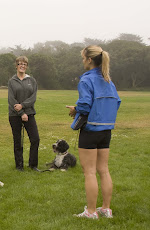
To determine whether your dog has separation anxiety, first consider if there are other causes for the problem behaviors like house soiling, destruction and vocalization.
House soiling: Other reasons dogs may eliminate when left alone include medical causes of housesoiling, inadequate house-training techniques, marking and prolonged periods without access to the appropriate areas to eliminate. If any of these are possible diagnoses, then house soiling should occur some of the time the owner is present not only when the pet is left alone.
Destruction: When dogs are destructive, alternate explanations such as young, energetic dogs with limited exercise or play and external stimuli that could arouse the dog should be explored. Dogs may be destructive at windows and doors during territorial displays. These types of problems will also be seen when the owner is present. Destruction may be a component in noise phobias such as thunderstorm phobias. External activities or territorial displays and not separation anxiety may also motivate barking dogs.
Animals that get into trash may be exhibiting food-seeking behavior. Animals that attempt to escape may have barrier frustrations concurrently with separation anxiety and may be fine if not confined. Geriatric dogs may be experiencing changes in cognition and should show other signs of cognitive decline such as wandering, loss of house training, disturbances in sleep cycles. If none of these apply, then a diagnosis of separation related anxiety is appropriate.
Treatment
To ensure success, there must be a change in the interaction between the owner and the pet in all phases of their relationship. It begins with how the owner behaves when they leave and when they return. The owner should keep the act of departure as low key as possible. Upon return it is important to keep the homecoming low key and not encourage overly excited greeting behavior. The recommendation is to ignore the dog for 15-30 minutes prior to departure and upon return. This is done on all departures, both planned and routine ones and by all family members.
Many of these dogs are extremely attached to their owners and follow them everywhere. Another key component to treatment is "independence" training. The owner should train the dog to remain calm and content at a distance from them and gradually to be in another room away from them. I suggest incorporating a dog's place in a designated area of the house where the dog is trained to down/stay and remain in this area while the owner leaves the room and gradually increases the time the dog can stay in another room away from them.
Most importantly, it is necessary to implement a structured program of complete consistency that allows the family to establish a "leadership" role. This helps to minimize confusion for the dog and reduces anxiety.
Finally, owners should make a point to spend quality time with their pets in activities such as games, walks/runs and training sessions. These activities help by stimulating their mental alertness, reducing frustration and releasing pent up energy.









